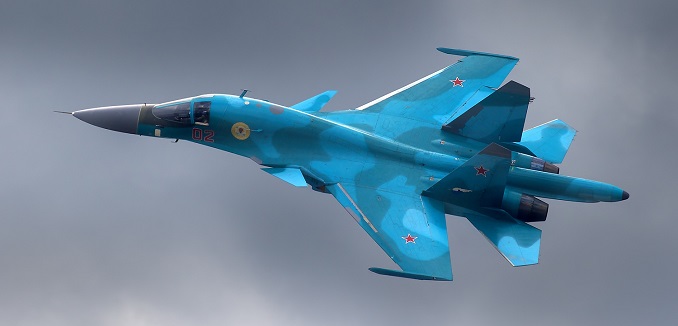Russian warplanes bombed a base in Syria last month that was being used by U.S. and British special forces, even after U.S. Central Command called its Russian counterpart and told them to desist, The Wall Street Journal reported Friday.
The base, located near the Jordanian border, is used to maintain a buffer zone to protect Jordan from ISIS, as well as serve as a meeting point for U.S.-trained Syrian forces and Jordan-based Western troops. Russian aircraft dropped cluster munitions on the base on June 16, less than 24 hours after British troops pulled out of the facility. The Journal reported further:
After that first Russian strike, officers with the U.S. military’s Central Command air operations center in Qatar called their counterparts in Russia’s air campaign headquarters in Latakia, Syria, U.S. officials said. The American officers told the Russians that the garrison was part of the U.S. campaign against Islamic State and shouldn’t be attacked.
Roughly 90 minutes after the U.S. warning was delivered, U.S. aircraft circling nearby watched as the Russians launched a second wave of strikes against the garrison.
A U.S. military surveillance aircraft overhead tried to hail the Russian pilots directly using the frequencies which the U.S. and Russian governments had agreed to use in emergencies.
The Russian pilots didn’t respond.
U.S. officials said four rebels were killed in the Russian strikes.
After the Pentagon demanded an explanation, Russian military officials at first said that they thought the base was used by ISIS. The Americans rejected that possibility because the garrison’s unique structure and other characteristics should have identified it as American on satellite imagery.
Russia then said that the strike was approved by Jordan, which the Jordanian government denied.
Moscow’s final explanation was that U.S. Central Command had never provided them with coordinates of their bases, so it had no precise way of knowing that it was an American facility. “U.S. officials said the Pentagon had never specifically asked the Russians to steer clear of the area around the At-Tanf garrison because it wasn’t close to any of the front lines between the Assad regime and opposing forces and because Russian aircraft didn’t operate in that part of Syria,” the Journal reported. “Moreover, distrust of Russian intentions ran so deep within the U.S. military and the CIA that U.S. officials didn’t want to tell the Russians any more than they had to, officials said.”
This strike has widened divisions within the Obama administration over how much to work with Russia in Syria. Military and intelligence agencies argued that Russia could not be trusted, and that Secretary of State John Kerry’s plan to share intelligence and further cooperate with Russia on anti-terror strategies in Syria, which he presented to Russian President Vladimir Putin last week, would only give Russia more information that it could use to strike American assets. Those in favor of Kerry’s proposal replied that refusing to cooperate with Russia would put U.S. efforts at greater risk.
But just before Kerry flew to Moscow, the Journal reported, Russian forces bombed a base 50 miles away from the first strikes, which was being used as a shelter for families of U.S.-backed rebels and other displaced Syrians:
Tllass Salameh, a commander with the Lions of the East rebel group which works out of the base, said 200 people were living at the “families’ camp.”
In the strike, the Russians used cluster munitions, which increased the number of casualties, according to Mr. Salameh and U.S. officials. Mr. Salameh said two young children, aged two and three, were killed along with two young women and a man in his mid-50s. In addition, 48 people were injured, all civilians, he said.
The Washington Post‘s Josh Rogin reported last week that Kerry’s Russia coordination plan would likely lead to the elimination of many of the main threats to the continued rule of Syrian dictator Bashar al-Assad, which include the terrorist group Jabhat al-Nusra but also other rebel groups, including U.S.-backed ones. Additionally, many in the Pentagon are concerned that Russia won’t hold up its obligations. “Even in the best-case scenario, where Russia and Syria hold up their end of the bargain, the result could be major advances for the Assad regime,” Rogin wrote. “While Jabhat al-Nusra is a problem, teaming up with the Russian air force might not be the best solution.”
[Photo: Oleg V. Belyakov / Wikimedia]




